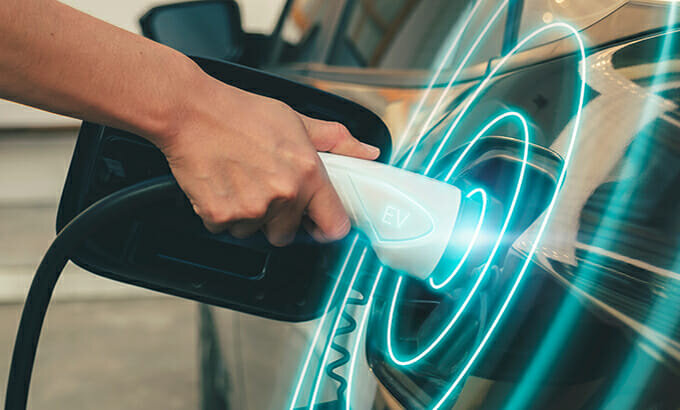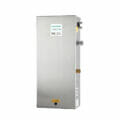Designers of residential electric vehicle (EV) charging stations will now be able to reduce the cost of complying with regulations by using chokes that exactly meet their requirements.
E-mobility Growth
E-mobility is a rapidly growing market and regulatory compliance is essential for charging stations. Development of the new RV Series choke from Schaffner is backed by the company’s decades of expertise as a global leader in electromagnetic solutions that minimise electromagnetic interference (EMI) and filter out noise. The new choke has been created to offer superior levels of performance when dampening and attenuating noise.
Offering Choice
By offering a broad range of specifications and performance choices, the RV choke enables designers to minimise costs. Costly over-design can be avoided through being able to select a solution that mitigates noise just below regulatory limits.
For different environments, the new RV Series offers the choice between ferrite (RV8140 & RV8540) and nanocrystalline (RV8141 & RV8541) core technology. Each current rating comes with eight different performance/size options, four of them designed for vertical (RV8540) and four for horizontal (RV8140) mounting.
AC and DC Applications
The four windings of the new choke are typically installed as three phases and neutral. For DC applications on the vehicle side the same choke is used – two windings of the choke are connected in series providing very high attenuation and protecting the vehicle from disturbances.
The new RV Series is designed for power ratings up to 30 kW with rated currents from 16 A to 50 A per phase at 60 °C ambient temperature. In terms of certification, the RV series complies with UL/IEC 60938-1/-2 and UL 1446. Other features of the new choke include low magnetic leakage flux, excellent winding insulation and low parasitic capacitance.


Residential Charging Market Demand
Felix Wedel, product manager at Schaffner, explains: “When designing residential EV charging stations, it is vital to be able to identify any potential electromagnetic compatibility (EMC) challenges and to deal with them as early as possible in the design process. This sector of the EV charging market is especially vibrant, so we are delighted to be offering a new and smaller product for power ranges up to 30 kW.”
Wedel adds: “Designed in response to market demands, this new RV series will save designers a considerable amount of bother during the certification process by giving them the tools to comply with all the relevant specifications and regulatory standards. A significant advantage for design engineers is that with this large choice of performance levels they are no longer restricted to using only a choke that is available. Now they can choose the one that fits perfectly to their technical requirements and avoid unnecessary costs. That is why it is important that EV charging station designers talk to Schaffner engineers very early in the development process to keep their costs to an absolute minimum.”
For more information, visit the Schaffner website at schaffner.com








